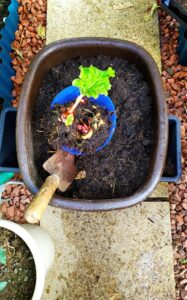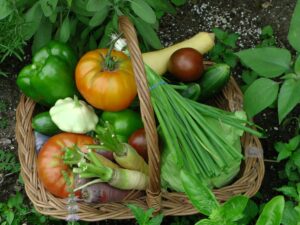Photo by Edward Howell on Unsplash
When it comes to cultivating a thriving garden and lush lawn, compost might just be the unsung hero of your outdoor oasis. This natural, nutrient-rich soil amendment is one of the most powerful tools in any gardener’s arsenal, and it’s easier to use than you might think.
What is Compost?
Compost is organic matter that has decomposed into a dark, crumbly, soil-like substance. It’s made from everyday kitchen scraps like fruit and vegetable peels, coffee grounds, eggshells, and yard waste like grass clippings and leaves. Over time, beneficial microorganisms break this material down into humus—a powerhouse of nutrients that plants absolutely love.
Photo by Craig Thomas on Unsplash

Why Compost Matters for Your Garden
- Boosts Soil Health
Compost enriches soil with essential nutrients and improves texture, helping it retain moisture while allowing proper drainage. Whether you’re planting flowers, vegetables, or shrubs, compost gives roots the perfect environment to grow strong and deep. - Feeds Plants Naturally
Unlike synthetic fertilizers that deliver a quick spike, compost releases nutrients slowly, encouraging consistent, healthy growth. It’s a natural way to feed your plants without harsh chemicals. - Supports Microbial Life
Healthy soil is alive. Compost supports worms, fungi, and beneficial bacteria, all of which help plants absorb nutrients more effectively.
Melnor Suggests: Use the Melnor Metal 2-Way Hose Connector to run multiple hoses or watering tools simultaneously when hydrating newly composted garden beds. A Melnor HydroLogic Water Timer can help you keep soil hydration levels up so your compost can break down effectively and feed your plants properly.
The Lawn Loves It Too
Your lawn can benefit just as much from compost as your flower beds or veggie patch.
- Thicker, Greener Grass: Top-dress your lawn with a thin layer of compost to naturally fertilize the soil. Compost helps grass grow thicker, greener, and more resilient.
- Improved Soil Structure: Especially in compacted or clay-heavy areas, compost loosens the soil and promotes root growth.
- Fewer Pests & Less Thatch: Healthier soil means fewer lawn problems over time.
Melnor Suggests: Use a Melnor Oscillating Sprinkler to gently water composted areas of your lawn evenly and efficiently. Look for models with adjustable coverage, like the MiniMax Turbo Oscillating Sprinkler, to avoid overwatering.
Composting is Easy!
You don’t need a fancy setup to get started. A simple compost bin, pile, or tumbler will do. Add a mix of “greens” (like veggie scraps and grass clippings) and “browns” (like leaves and shredded newspaper), keep it moist, and turn it occasionally.
Melnor Suggests: Once your compost is worked into the soil, keep it moist, but not soggy. Our HydroLogic Water Timers can help you keep that compost from getting too dry.

The Bottom Line
Compost isn’t just good for your garden, it’s good for the planet. By recycling kitchen and yard waste, you reduce landfill waste and decrease your need for synthetic fertilizers. Your plants and grass will reward you with vibrant growth and healthier soil.
Photo by Annie Lang on Unsplash
So, grab a shovel, mix in some compost, and let nature do the rest. And with a few trusty Melnor tools by your side, you’ll make the most of every scoop of that garden gold.

